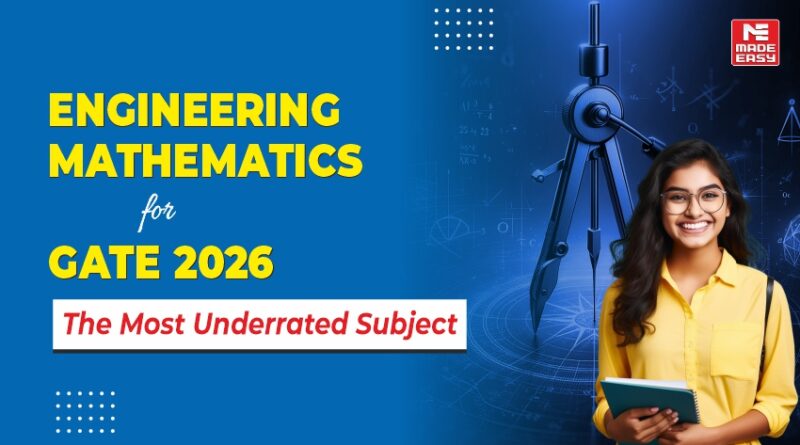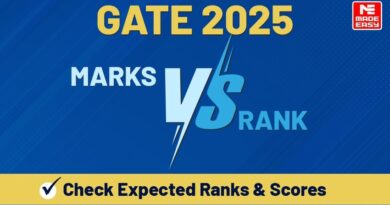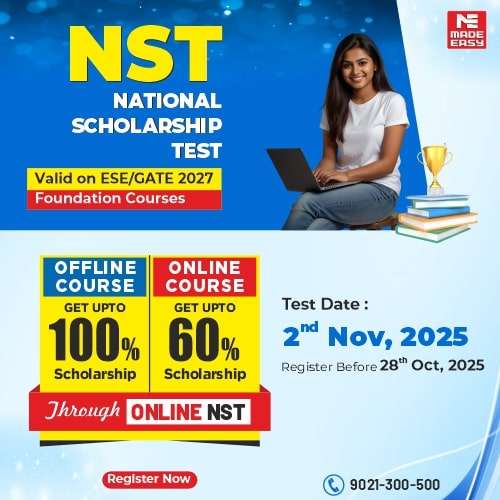Engineering Mathematics for GATE – The Most Underrated Subject
When preparing for GATE 2026, most aspirants pour endless hours into their core subjects, solving complex problems and memorizing detailed formulas. Yet, in this race, one section that often gets sidelined, sometimes underestimated, is Engineering Mathematics. Despite being a scoring subject and carrying a consistent weightage across almost every GATE paper, many candidates treat it as secondary. The truth, however, is quite the opposite: mastering Engineering Mathematics can be the game-changer that separates a good score from a top rank.
GATE is more than just a test of subject knowledge; it evaluates analytical ability, logical thinking, and problem-solving skills. This is where Engineering Mathematics plays a central role. With topics like Linear Algebra, Calculus, Differential Equations, Probability, and Numerical Methods, the subject may look deceptively simple at first glance. But here’s the catch: these “basic” concepts are often the foundation for solving advanced problems in other sections. In other words, neglecting Engineering Mathematics doesn’t just cost you direct marks; it can weaken your performance in your core subjects too.
For GATE 2026, the exam will be organized by IIT Guwahati, and like every year, Engineering Mathematics will carry significant weightage. Even a modest effort in this subject can result in high returns, thanks to the relatively straightforward nature of its questions compared to the tougher, concept-heavy problems in other sections.
So, in today’s blog, we’ll discuss why engineering mathematics is the most underestimated subject in GATE preparation. We’ll also explore its true importance and strategies to maximize your scores. If you’ve been underestimating this section, it’s time to reconsider your strategy, because it can be your strongest ally on exam day.
The following engineering streams comprise Engineering Mathematics as an important subject:
- Civil Engineering
- Mechanical Engineering
- Computer Science and Information Technology Engineering
- Electrical Engineering
- Electronics and Telecommunications Engineering
Engineering Mathematics syllabus for GATE:
Now, let us find out the important sections associated with the Engineering mathematics syllabus for GATE.
Table of Contents
Each of these 11 sections of Engineering Mathematics for GATE comprises topics that have varied mark weightage from the competitive examination point of view.
Calculus:
Functions of two or more variables, continuity, directional derivatives, partial derivatives, total derivative, maxima and minima, saddle point, and method of Lagrange’s multipliers. Double and Triple integrals and their applications to area, volume, and surface area; Vector Calculus: gradient, divergence, and curl, Line integrals and Surface integrals, Green’s theorem, Stokes’ theorem, and Gauss divergence theorem.
Linear Algebra:
Finite-dimensional vector spaces over real or complex fields; Linear transformations and their matrix representations, rank and nullity; systems of linear equations, characteristic polynomial, eigenvalues and eigenvectors, diagonalization, minimal polynomial. Cayley-Hamilton Theorem, Finite-dimensional inner product spaces, Gram-Schmidt orthonormalization process, symmetric, skew-symmetric, Hermitian, skew-Hermitian, normal, orthogonal, and unitary matrices; diagonalization by a unitary matrix, Jordan canonical form; bilinear and quadratic forms.
Real Analysis:
Metric spaces, connectedness, compactness, completeness; Sequences and series of functions, uniform convergence, Ascoli-Arzela theorem; Weierstrass approximation theorem; contraction mapping principle, Power series. Differentiation of functions of several variables, Inverse and Implicit function theorems; Lebesgue measure on the real line, measurable functions; Lebesgue integral, Fatou’s lemma, monotone convergence theorem, dominated convergence theorem.
Complex Analysis:
Functions of a complex variable: continuity, differentiability, analytic functions, harmonic functions; Complex integration: Cauchy’s integral theorem and formula; Liouville’s theorem, maximum modulus principle, Morera’s theorem; zeros and singularities; Power series, radius of convergence, Taylor’s series and Laurent’s series; Residue theorem and applications for evaluating real integrals; Rouche’s theorem, Argument principle, Schwarz lemma; Conformal mappings, Mobius transformations.
Ordinary Differential Equations:
First order ordinary differential equations, existence and uniqueness theorems for initial value problems, linear ordinary differential equations of higher order with constant coefficients; Second order linear ordinary differential equations with variable coefficients; Cauchy-Euler equation, method of Laplace transforms for solving ordinary differential equations, series solutions (power series, Frobenius method); Legendre and Bessel functions and their orthogonal properties; Systems of linear first order ordinary differential equations, Sturm’s oscillation and separation theorems, Sturm-Liouville eigenvalue problems, Planar autonomous systems of ordinary differential equations: Stability of stationary points for linear systems with constant coefficients, Linearized stability, Lyapunov functions.
Algebra:
Groups, subgroups, normal subgroups, quotient groups, homomorphisms, automorphisms; cyclic groups, permutation groups, Group action, Sylow’s theorems and their applications; Rings, ideals, prime and maximal ideals, quotient rings, unique factorization domains, Principle ideal domains, Euclidean domains, polynomial rings, Eisenstein’s irreducibility criterion; Fields, finite fields, field extensions, algebraic extensions, algebraically closed fields.
Functional analysis:
Normed linear spaces, Banach spaces, Hahn-Banach theorem, open mapping and closed graph theorems, the principle of uniform boundedness; Inner-product spaces, Hilbert spaces, orthonormal bases, projection theorem, Riesz representation theorem, spectral theorem for compact self-adjoint operators.
Numerical analysis:
Systems of linear equations: Direct methods (Gaussian elimination, LU decomposition, Cholesky factorization), Iterative methods (Gauss-Seidel and Jacobi) and their convergence for diagonally dominant coefficient matrices; Numerical solutions of nonlinear equations: bisection method, secant method, Newton-Raphson method, fixed point iteration; Interpolation: Lagrange and Newton forms of interpolating polynomial, Error in polynomial interpolation of a function; Numerical differentiation and error, Numerical integration: Trapezoidal and Simpson rules, Newton-Cotes integration formulas, composite rules, mathematical errors involved in numerical integration formulae; Numerical solution of initial value problems for ordinary differential equations: Methods of Euler, Runge-Kutta method of order 2.
Partial Differential Equations:
Method of characteristics for first-order linear and quasilinear partial differential equations; Second order partial differential equations in two independent variables: classification and canonical forms, method of separation of variables for Laplace equation in Cartesian and polar coordinates, heat and wave equations in one space variable; Wave equation: Cauchy problem and D’Alembert formula, domains of dependence and influence, non-homogeneous wave equation; Heat equation: Cauchy problem; Laplace and Fourier transform methods
Topology:
Basic concepts of topology, bases, subbases, subspace topology, order topology, product topology, quotient topology, metric topology, connectedness, compactness, countability and separation axioms, Urysohn’s Lemma.
Linear Programming:
Linear programming models, convex sets, extreme points; Basic feasible solution, graphical method, simplex method, two-phase methods, revised simplex method; Infeasible and unbounded linear programming models, alternate optima; Duality theory, weak duality, and strong duality; Balanced and unbalanced transportation problems, Initial basic feasible solution of balanced transportation problems (least cost method, northwest corner rule, Vogel’s approximation method); Optimal solution, modified distribution method; Solving assignment problems, Hungarian method.
Now, let us dive into understanding how to prepare for the most underrated subject in GATE 2026, i.e., engineering mathematics.
Understand the subject well:
Before delving into in-depth GATE preparation, one must first comprehend the parts and topics included in this competitive examination. The entire engineering mathematics syllabus for GATE can be found in the preceding section.
Create a plan:
Yes, you heard that right! Having a proper study plan is one of the most important steps in preparing for GATE 2026. A well-structured plan will help you understand exactly how much time you need to dedicate to each section, ensuring that no important topic is left behind. Since Engineering Mathematics is a scoring and high-weightage subject, it deserves a significant portion of your daily study hours. Make sure you spend enough time not only reading the concepts but also learning how to apply formulas and solve problems effectively.
If you feel unsure about certain topics or methods, it is a good idea to seek guidance from a subject expert or mentor from the very beginning of your preparation. A mentor can help you clarify doubts, suggest the most important topics to focus on, and provide tips to solve problems faster. Following expert guidance along with your proper study plan will make your preparation more focused, save time, and increase your chances of scoring well in Engineering Mathematics.
Prioritize regular practice:
You must be aware that one of the subjects with the highest scores on the GATE Exam 2025 is engineering mathematics. To start from scratch when developing your concepts, you might practice the questions included in the Engineering Mathematics books for the GATE Exam. Practice at least 15 to 20 questions a day to build the necessary conceptual foundation for the test. After you have finished studying for the GATE Engineering Mathematics course, you need to make sure you take as many mock exams as possible. It will help you find out the areas for improvement until the examination time.
Aim to improve focus and speed:
To score well in Engineering Mathematics, you need to stay focused and work quickly but carefully. Practicing regularly and staying consistent will make a big difference. Make sure you use the right books, notes, or tools to help you understand the concepts. With dedication and smart preparation, you can master the subject and do well on exam day.
Avoid memorizing:
Memorizing subjects like engineering mathematics does not help in the long term for the competitive exam. Therefore, one must avoid memorizing this subject’s concepts for the GATE examination. It might take time to strengthen this subject, but you will see that you can answer the questions related to the subject in the best possible manner.
Treat time like treasure:
When preparing for highly competitive examinations like GATE, it is important to recognize the importance of Engineering Mathematics. This subject not only carries significant weightage but also demands consistent effort and smart preparation. To score well, aspirants must approach it with diligence and discipline, ensuring that every study session is productive. One of the key aspects of effective preparation is time management. Many students lose valuable hours to distractions or unplanned activities, which ultimately hamper their progress. To avoid this, make use of digital tools and apps that can help you organize your daily routine, track your study hours, and set achievable goals. Eliminating time wastage allows you to focus more deeply on problem-solving, practice, and concept clarity. Remember, in an exam as competitive as GATE, every second counts, and structured preparation can make the difference between an average score and an excellent rank.
Book for Engineering Mathematics
There have been a number of books in the market with various publications, as this subject does require bookish knowledge. There have been many books on engineering mathematics with detailed explanations and many previous-year solved question papers. The MADE EASY Team has put significant effort into providing students with insights into the subject and topic-wise previous year’s questions. This will undoubtedly help you cover the entire syllabus of GATE.
Here are some of the questions associated with Engineering Mathematics in the GATE 2026 exam.
Last but not the least….
As we come to the end of this blog, it’s important to understand why Engineering Mathematics is one of the most underrated subjects in GATE 2026. Many students focus mostly on their core engineering subjects, thinking they will get most of their marks there. But ignoring Engineering Mathematics can be a big mistake. This subject is not just another part of the syllabus; it is the foundation that helps you think clearly, solve problems faster, and improve your overall performance in the exam.
One reason students underestimate Engineering Mathematics is that the topics often seem “easy” or familiar. Subjects like Linear Algebra, Calculus, Differential Equations, Probability, and Numerical Methods are taught in college, so students think they don’t need to practice them. But these topics form the base for solving more difficult problems. If you understand them well, you can save time during the exam, avoid mistakes, and even solve tricky questions in other sections more easily.
To do well in Engineering Mathematics, you need regular practice and smart planning. Don’t just memorize formulas, but rather understand how and when to use them. Solve previous years’ questions, take mock tests, and revise important concepts often. Managing your time is also very important. Using planners or study apps can help you stay focused and make every study hour count.
Doing well in this subject also boosts your confidence. Because many students overlook it, those who prepare properly can easily score well. This can reduce stress on the exam day and give you a positive mindset for the tougher sections. With consistent effort, Engineering Mathematics can become your strongest subject and help you achieve a higher overall score.
In the end, Engineering Mathematics is more than just a subject; it is a chance to improve your GATE score and strengthen your problem-solving skills. For GATE 2026, it’s time to give this subject the attention it deserves. Practice regularly, understand the concepts, and manage your time wisely. Treat it as your ally rather than a side topic. By doing this, you can turn an underrated subject into one of your biggest advantages and move closer to your dream score in GATE.
MADE EASY wishes you ALL THE BEST FOR GATE 2026 Exam!
FAQs:
Q.1 – What is Engineering Mathematics?
Ans: Engineering Mathematics is a part of applied mathematics. It comprises mathematical methods and techniques that are applicable in the respective engineering fields.
Q.2 – Is engineering mathematics important for the GATE exam?
Ans: Yes. Engineering mathematics is very significant for the GATE 2026 exam. This subject comprises 12 to 15 marks out of the total 100 marks, which makes it quite important for this competitive exam
Q.3 – Which is the best book for Engineering Mathematics?
Ans: Engineering Mathematics for the GATE exam is a high-scoring subject. Therefore, the book covering the syllabus of GATE 2026 thoroughly is the best book. Topics like Calculus, Linear Algebra, Real Analysis, Complex Analysis, Ordinary Differential equations, Algebra, Functional Analysis, Numerical Analysis, Partial Differential Equations, Topology, and Linear Programming with previous year solved question paper is considered the best book for engineering mathematics.
Q.4 -Are international students allowed to sit for GATE 2026?
Ans: Yes. International students must fulfill the required eligibility criteria to sit for the GATE examination for the 2025 session. The respective candidate must have completed their bachelor’s degree in engineering or technology, or be presently in the final year. Apart from this, you can also apply for the examination if you have completed or are presently pursuing a postgraduate degree. It is important to provide the required documents to sit for the competitive examination. This includes a provisional certificate or a degree completion certificate as per the current state of education.
Q.5 – Who is conducting GATE 2026?
Ans: IIT Guwahati is conducting GATE 2026.
Q.6 – How many times is the GATE examination conducted every year?
Ans: The GATE examination is conducted once every year.
Q.7 – Is Engineering Maths the same for all branches of the GATE?
Ans: Yes, Engineering Mathematics is almost the same for all the branches of the GATE including civil engineering, mechanical engineering, electrical engineering, electronics and communication engineering, computer science and information technology, instrumentation engineering, production and industrial engineering, and environmental science and engineering.
Q.8 – What is the weightage of Engineering Mathematics in GATE?
Ans: The topic and questions of engineering mathematics are compulsory and have high scoring, as they carry 15% of the total weightage.
Dear Aspirants,
Your preparation for GATE, ESE, PSUs, and AE/JE is now smarter than ever — thanks to the MADE EASY YouTube channel.
This is not just a channel, but a complete strategy for success, where you get toppers strategies, PYQ–GTQ discussions, current affairs updates, and important job-related information, all delivered by the country’s best teachers and industry experts.
If you also want to stay one step ahead in the race to success, subscribe to MADE EASY on YouTube and stay connected with us on social media.
MADE EASY — where preparation happens with confidence.






I am a diploma student and got lateral entry into B.Tech so what should be my strategy from where should I start. Please help and thanks for the article.
Dear Rahul,
Thank you for writing to us. Whether you are a lateral entry or not, the preparation strategy will not change for either of the candidates.If you work hard and show complete dedication then anything is achievable. Get started with the syllabus and follow the strategy given in the article. You will surely excel in this subject.
Keep Reading
Team MADE EASY
Dear sir
I need engineering mathematics previous years solved question for gate mechanical engineering.
In addition to that I need solved question paper for all the subjects of mechanical engineering for gate 2021.
Where do I can get all those?
Dear Aditya,
We would request you to visit our website https://madeeasypublications.org/
Regards,
Team MADE EASY